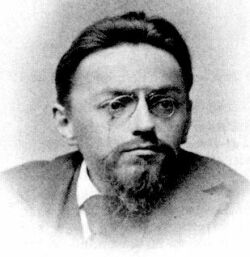Charles Proteus Steinmetz (nonfiction): Difference between revisions
(Created page with "thumb|Charles Proteus Steinmetz. (April 9, 1865 – October 26, 1923; birth-name: Karl August Rudolph Steinmetz) was a German-born Ameri...") |
No edit summary |
||
| Line 1: | Line 1: | ||
[[File:Charles_Proteus_Steinmetz.jpg|thumb|Charles Proteus Steinmetz.]] (April 9, 1865 – October 26, 1923; birth-name: Karl August Rudolph Steinmetz) was a German-born American [[Mathematician (nonfiction)|mathematician]] and electrical engineer and professor at Union College. | [[File:Charles_Proteus_Steinmetz.jpg|thumb|Charles Proteus Steinmetz.]]'''Charles Proteus Steinmetz''' (April 9, 1865 – October 26, 1923; birth-name: Karl August Rudolph Steinmetz) was a German-born American [[Mathematician (nonfiction)|mathematician]] and electrical engineer and professor at Union College. | ||
He fostered the development of alternating current that made possible the expansion of the electric power industry in the United States, formulating mathematical theories for engineers. He made ground-breaking discoveries in the understanding of hysteresis that enabled engineers to design better electromagnetic apparatus equipment including especially electric motors for use in industry. | He fostered the development of alternating current that made possible the expansion of the electric power industry in the United States, formulating mathematical theories for engineers. He made ground-breaking discoveries in the understanding of hysteresis that enabled engineers to design better electromagnetic apparatus equipment including especially electric motors for use in industry. | ||
Steinmetz is known for his contribution in three major fields of alternating current (AC) systems theory: hysteresis, steady-state analysis, and transients. | |||
Based on Steinmetz experiments, "Steinmetz's formula" defines the approximate heat energy due to magnetic hysteresis released, per cycle per unit area of magnetic material. Steinmetz equivalent circuit theory is still widely used for the design and testing of induction motors. | |||
A member of the original Technical Alliance, which also included Thorstein Veblen and Leland Olds, Steinmetz had great faith in the ability of machines to eliminate human toil and create abundance for all. He put it this way: "Some day we make the good things of life for everybody". | |||
Steinmetz is featured in John Dos Passos's U.S.A. trilogy in one of the biographies. | |||
== In the News == | == In the News == | ||
| Line 18: | Line 26: | ||
* [https://en.wikipedia.org/wiki/Charles_Proteus_Steinmetz Charles Proteus Steinmetz] @ Wikipedia | * [https://en.wikipedia.org/wiki/Charles_Proteus_Steinmetz Charles Proteus Steinmetz] @ Wikipedia | ||
[[Category:Nonfiction (nonfiction)]] | [[Category:Nonfiction (nonfiction)]] | ||
| Line 24: | Line 31: | ||
[[Category:Mathematicians (nonfiction)]] | [[Category:Mathematicians (nonfiction)]] | ||
[[Category:People (nonfiction)]] | [[Category:People (nonfiction)]] | ||
Revision as of 08:43, 19 March 2017
Charles Proteus Steinmetz (April 9, 1865 – October 26, 1923; birth-name: Karl August Rudolph Steinmetz) was a German-born American mathematician and electrical engineer and professor at Union College.
He fostered the development of alternating current that made possible the expansion of the electric power industry in the United States, formulating mathematical theories for engineers. He made ground-breaking discoveries in the understanding of hysteresis that enabled engineers to design better electromagnetic apparatus equipment including especially electric motors for use in industry.
Steinmetz is known for his contribution in three major fields of alternating current (AC) systems theory: hysteresis, steady-state analysis, and transients.
Based on Steinmetz experiments, "Steinmetz's formula" defines the approximate heat energy due to magnetic hysteresis released, per cycle per unit area of magnetic material. Steinmetz equivalent circuit theory is still widely used for the design and testing of induction motors.
A member of the original Technical Alliance, which also included Thorstein Veblen and Leland Olds, Steinmetz had great faith in the ability of machines to eliminate human toil and create abundance for all. He put it this way: "Some day we make the good things of life for everybody".
Steinmetz is featured in John Dos Passos's U.S.A. trilogy in one of the biographies.
In the News
Fiction cross-reference
Nonfiction cross-reference
External links:
- Charles Proteus Steinmetz @ Wikipedia
